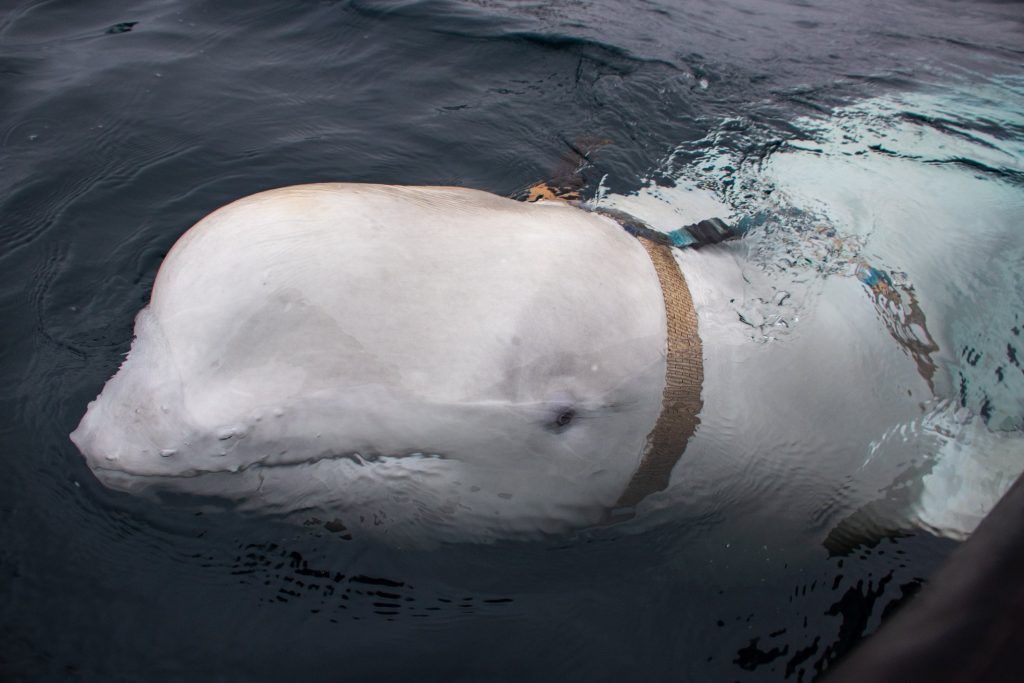From Russia with blubber: a beluga whale spy on Arctic patrol?
By Matt Field | May 1, 2019
 Norwegian authorities and a local fisherman helped free this beluga whale from a harness. Credit: Norwegian Directorate of Fisheries.
Norwegian authorities and a local fisherman helped free this beluga whale from a harness. Credit: Norwegian Directorate of Fisheries.
A beluga whale was spotted swimming up to Norwegian fishing boats last week. It may have been seeking food or looking to free itself from the harness wrapped around its body. Norwegian fisheries staff were soon on hand to give the creature a bit of cod fillet and help free it from entanglement. Though trained to free whales caught up in a variety of gear, this time the Directorate of Fisheries found something unexpected: The harness on the beluga, designed to mount a camera, read “Equipment St. Petersburg.”
“People in Norway’s military have shown great interest,” Joergen Ree Wiig, a directorate employee who helped free the animal, told the AP. The wire service reported that a professor at the Arctic University of Norway, Audun Rikardsen, checked with other scholars in Norway and Russia about beluga whale research. His colleagues didn’t mention any projects, and Rikardsen suspects the whale belongs to the Russian Navy.
If that’s true, it wouldn’t be the first time that marine mammals have been conscripted into military service. The Soviet Union had a program that used whales and dolphins to deliver mines to targets and to attack enemy swimmers. Although that effort apparently ended, the Russian Defense Ministry reportedly started a program to train sea mammals to guard naval bases. The US Navy’s Marine Mammal Program, meanwhile, puts dolphins and sea lions to work locating mines, retrieving sunken equipment, and protecting military installations.
The belugas’ native habitat, the Arctic, has become a hotbed of military and economic activity. Because climate change, the arctic sea ice retreats ever closer to the North Pole during the warmer summer months. That means companies and governments can access new routes and resources. International regulators have approved new shipping lanes in the Arctic Ocean. And Russia and other countries have begun to aggressively exploit the region’s oil and gas reserves.
Militaries are taking note of the thaw and making corresponding investments in facilities, troops, equipment, and training in the north. In 2018, a NATO exercise in Norway involved 50,00 personnel and 31 countries, the largest such exercise since the Cold War.
In a new report, the US Coast Guard said that physical changes and increased competition have “made the Arctic a strategically competitive space for the first time since the end for the Cold War.” (The phrase “climate change” does not appear in the 48-page document.) The service is concerned that as China’s economic and scientific presence in the Arctic expands, Beijing will take a page from its playbook in the East and South China seas. In a relentless drive to expand its territory in those regions, China has built islands and faced off against opposing coast guards.
Russia, meanwhile, has the longest Arctic coast line, largest icebreaker fleet, and most developed Arctic infrastructure. For Russia, economic and security interests are closely tied together in the Arctic. The country’s president Vladimir Putin called it “the most important region,” and Moscow has opened three new military bases there. Russia is expanding its icebreaker fleet to guide cargo through the treacherous region and is also increasing troop deployments. The United States “must take heed of Russia’s actions and potential dual-use of its capabilities,” the Coast Guard strategy document said.
To match its rivals and operate more effectively in the Arctic, the US Coast Guard will invest in ships, planes, personnel, and other resources to undertake search and rescue missions, defense operations, and scientific efforts. The Coast Guard document does not mention any effort to match Russia’s beluga whale capabilities.
Publication Name: Ars Technica
To read what we're reading, click here
Together, we make the world safer.
The Bulletin elevates expert voices above the noise. But as an independent nonprofit organization, our operations depend on the support of readers like you. Help us continue to deliver quality journalism that holds leaders accountable. Your support of our work at any level is important. In return, we promise our coverage will be understandable, influential, vigilant, solution-oriented, and fair-minded. Together we can make a difference.
Keywords: Arctic, Norway, Russia, animals, beluga whale
Topics: Climate Change, What We’re Reading















